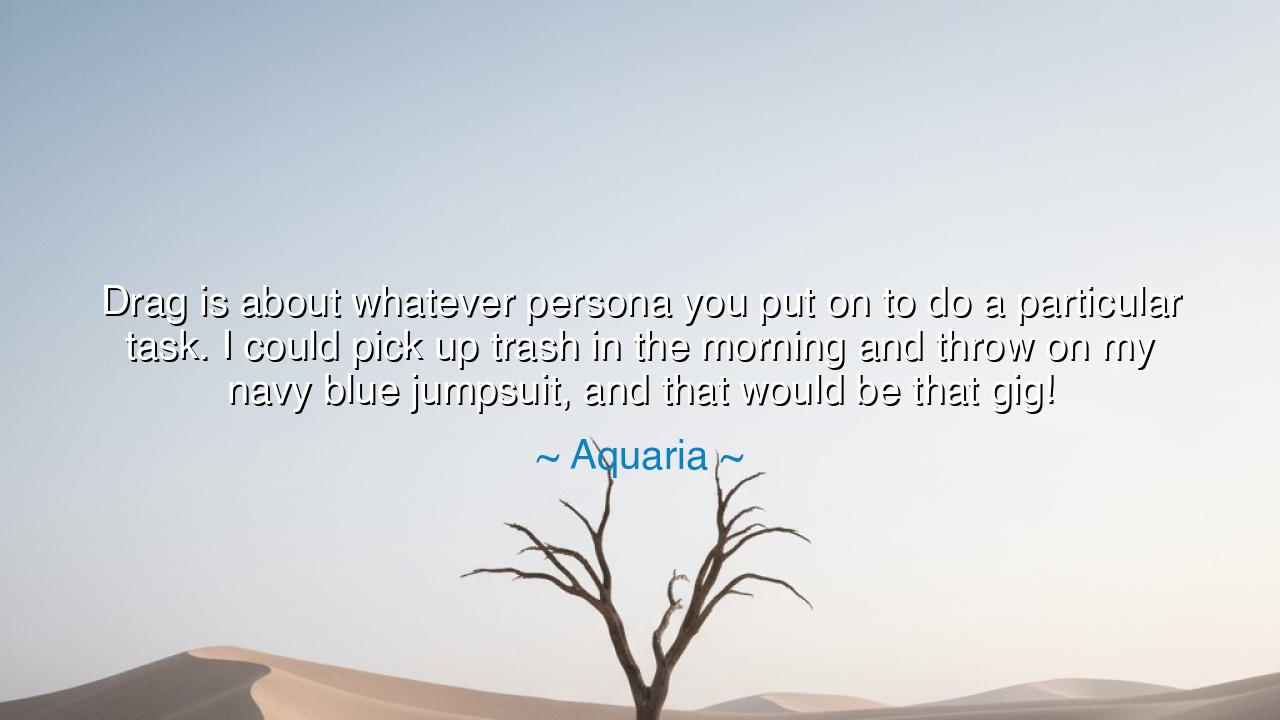
Drag is about whatever persona you put on to do a particular
Drag is about whatever persona you put on to do a particular task. I could pick up trash in the morning and throw on my navy blue jumpsuit, and that would be that gig!






"Drag is about whatever persona you put on to do a particular task. I could pick up trash in the morning and throw on my navy blue jumpsuit, and that would be that gig!" These words from Aquaria offer a powerful reflection on the transformative nature of identity and self-expression. Drag, in this context, is not just about clothing or performance; it is about the persona one assumes, the outward manifestation of inner strength and creativity. Aquaria speaks to the idea that the roles we take on in life are not fixed—they are choices, performances, and expressions that allow us to navigate the world with purpose and meaning. Just as one might change outfits for different occasions, one can also shift their identity to match the task at hand, infusing each role with intention and authenticity.
In the ancient world, the concept of persona was central to both life and performance. The word itself comes from the Latin, meaning "mask," and in the theatrical traditions of ancient Greece and Rome, actors would don physical masks to take on different roles. The Greek theater was not just entertainment; it was a space for reflecting on the human condition, for exploring identity, masks, and the roles we play. Sophocles and Euripides, through their tragedies, invited the audience to question their own identities, to consider how much of themselves was shaped by the roles they were expected to play. Just as Aquaria speaks of the persona she adopts to perform her tasks, the ancient actors also wore their masks to step into roles that allowed them to explore the depths of the human spirit.
The concept of persona extends beyond the stage and into everyday life. Consider the Spartan warriors, who, before battle, would don their armor and shields not only to protect their bodies but to assume the role of fierce defenders of their city-state. The armor was more than just protection; it was a symbol of their duty, their identity as warriors, and their commitment to the ideals of honor and strength. By wearing the armor, they did not just prepare themselves physically, but psychologically—they were transforming into the very essence of what it meant to be a Spartan. Aquaria’s words echo this idea—by putting on the persona of drag, she is not simply dressing up; she is embodying a part of herself that allows her to express courage, creativity, and power in ways that transcend the ordinary.
Likewise, in the Roman Empire, the emperor would wear elaborate regalia to signify their divine right to rule. This ceremonial attire was a mask, not in the sense of hiding the self, but in the sense of elevating it to something greater, something worthy of respect and power. The emperor's persona was not just a personal identity but a representation of the collective aspirations of the empire. When Aquaria says that she can wear a navy blue jumpsuit to perform the task of picking up trash, she echoes the ancient practice of role assumption—what you wear, what you choose to embody, shapes the energy and intention you bring to the world. The jumpsuit, in this case, becomes a tool of expression, an extension of the self that enables the wearer to approach any task, whether humble or grand, with a sense of purpose and agency.
In the same way, consider the warrior poets of the ancient world, like Homer, who both fought and wrote. Homer’s Iliad and Odyssey were not mere tales of adventure, but explorations of identity—who we are when we fight, and who we are when we return home. The characters in these epics wear their armor, their identities as warriors, and through their trials, they strip away the false masks to reveal their humanity. Aquaria’s reference to wearing a persona for different tasks is not unlike the warrior poets. Both engage in acts of creation and transformation, shaping themselves and their world through the roles they assume. Just as the ancient warriors found their identities in their armor and weapons, modern individuals, through drag or any other form of self-expression, can find their own power by choosing the roles they wish to inhabit.
The lesson here is one of empowerment and awareness. Aquaria’s reflection on the persona she adopts through drag speaks to the larger truth that we are all, in some sense, performers in the theater of life. The roles we take on are not imposed upon us; they are choices—expressions of the selves we wish to embody in any given moment. Whether we put on a costume for a performance, a suit for a business meeting, or a uniform for a daily task, we are choosing how to present ourselves to the world. The power lies not in the task itself but in the intentionality behind it, in how we choose to approach the roles we are given or that we create for ourselves.
In practical terms, this means we must embrace the roles we play, not as limitations, but as empowering tools for self-expression. Just as Aquaria uses drag to embody different aspects of herself, so can we all find ways to step into our roles with purpose and creativity. Whether in our work, relationships, or personal growth, we can choose to embody the persona that helps us achieve our highest potential. And like the great figures of the ancient world, we must remember that our true strength comes not from the roles we play, but from our awareness of them and the power we invest in them.






AAdministratorAdministrator
Welcome, honored guests. Please leave a comment, we will respond soon